The Partnership: ‘Hacks’ Creators Lucia Aniello, Paul W. Downs & Jen Statsky On What Inspired The Show, What’s Next & Who Might Get A Spinoff
- Oops!Something went wrong.Please try again later.
- Oops!Something went wrong.Please try again later.
- Oops!Something went wrong.Please try again later.
- Oops!Something went wrong.Please try again later.
- Oops!Something went wrong.Please try again later.
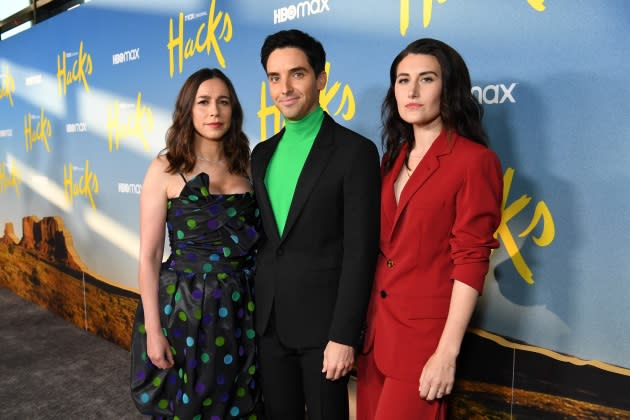
Hacks was first born on a road trip to a Monster Jam rally back in 2015. It was during the drive that couple Paul W. Downs and Lucia Aniello and their close friend Jen Statsky discussed the relative invisibility of female comedians compared to their male counterparts. Having bonded as co-writers, producers, and in the case of Aniello and Downs, directors and actors on the Comedy Central series Broad City, together the trio cooked up HBO Max’s Hacks. In its first season, which also stars Downs as agent Jimmy LuSaque, the show’s depiction of female comedian Deborah Vance (Jean Smart) and her protégé Ava Daniels (Hannah Einbinder) won Emmys for writing and directing, and acting for Smart. Now, its second season boasts 17 nominations, among them, Outstanding Comedy Series. It has also been renewed for a third season.
In conversation with Deadline, the three creators discuss their decision to take Deborah’s show on the road in Season 2, and how a series that gives nuanced voice to women and the LGBTQ community is more important than ever right now.
More from Deadline
DEADLINE: You guys make your creative collaboration seem very smooth. As a trio that produces, writes and directs Hacks, how do you break down the workload?
LUCIA ANIELLO: Well, it isn’t really separated to be honest. It’s not like this person’s responsible for the story and this person does dialogue and this person’s on set or anything like that. All three of us are always in the writers’ room and we’re all three on set at all times. We really do discuss a lot of stuff. And I think the thing that we’ve always worked on, is to have a really honest, open collaboration. Honestly, we don’t have to debate too often because 90 percent of the time, we just are always in agreement. I do credit that to us being really committed to our communication and making our relationships as friends and as a couple before our relationship as collaborators. And, if there ever is a disagreement, number three is amazing because it’s a quick vote and you get to just say, “Well, these two people think this and this person doesn’t.” But honestly, if there ever is that breakdown where two people think one thing, one person thinks another, we most often than not say, “Let’s just try and find something else that we all agree on.” And that, honestly, often pushes us up to find a better solution.
JEN STATSKY: I was just going to add that making this show about a creative collaboration has made me very interested about other past collaborations and how people navigate them. I do think what Lucia said is true, it’s this ego thing. It seems that ego can often be the death of creative collaboration when you start asking, “Is it my idea?” versus what is for the good of the show. I would say that Paul and Lucia are very good at celebrating ideas and I aspire to be as good as them.
PAUL W. DOWNS: Yeah. When Jen or Lucia have a great idea, I feel like it’s my idea anyway [laughs].
STATSKY: I think that also goes for people in the room or actors on set. Whoever has something that makes the show better, we’re excited to use it. To us, we’re all making it together so it doesn’t really matter if the idea comes way above the line or way below the line. We’re just happy to share that with everybody.
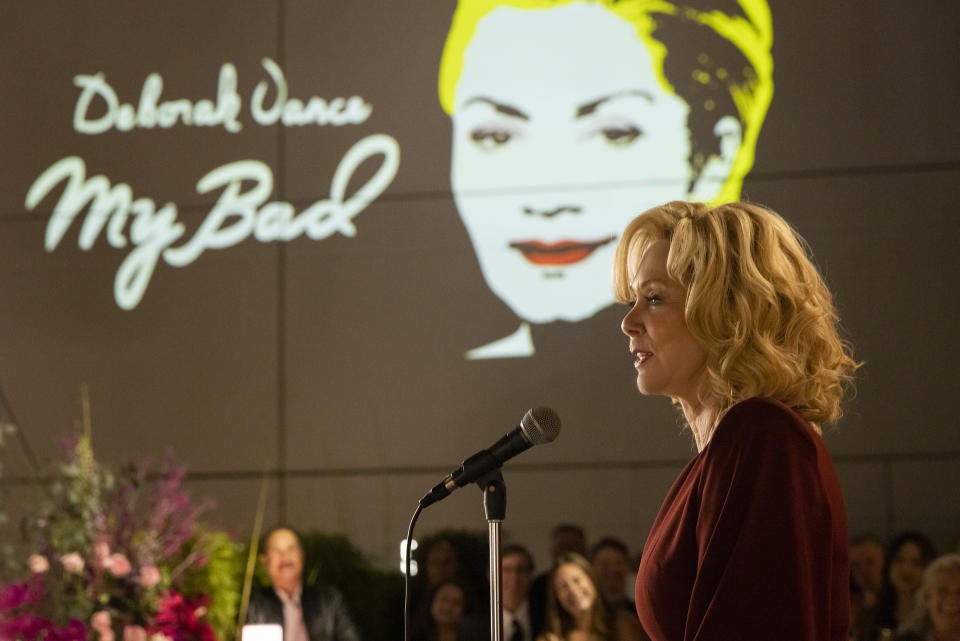
Karen Ballard/HBO Max
DEADLINE: Season 1 created a very successful backdrop of Deborah ruling over Vegas and Ava finding her place in all of it. You could have easily continued on in that world since it was so popular with the fans, instead you decided to take everyone on the road. What brought on that decision and how did it expand the Hacks universe?
DOWNS: We knew in Season 1, at the end, that we were going to be going on the road. I think the reason that we felt emboldened to do that — because like you say, we had established a place and a setting and people responded to that, so it was in a way a risk, to just get on the road and go all over the country — but I think it reflects the central idea of the show, which is about these two women who have been cast aside by the industry, who have had to make a name for themselves in the Nevada desert.
By putting them on the road, we got to do that even more intensely because not only was it them against the world, but when you travel with someone, there is a microscope on everything you do, for better or worse. It actually was a great way to do the same thing, even though it looked like it was totally new. So it was kind of a ‘both ends’ scenario.
ANIELLO: We always try to be very grounded and truthful in the storytelling of what happens to our characters. The truth is, Deborah advances as a stand-up. Stand-ups, when they need to work something out, they go on the road to do it. As Paul said, it deepened the relationship, it presented new challenges, it brought them closer and further apart in some ways. But also, it is just the real-life thing of what stand-ups do when they have a new hour that they’re trying to craft and work out. So we also wanted to portray that creative endeavor truthfully.
DEADLINE: There were more moments of broad comedy in this season, was that something you wanted to explore more of?
DOWNS: Yeah. One of our bigger challenges was how can you tell stories when you’re in a tour bus? It’s not Deborah’s mansion, but it also allowed us to do those things where Ava’s stuffed into a tiny bunk bed and hits her head anytime the bus goes over a pothole. Or Deborah’s able to toss anything she wants out a window at any moment. So, it was both a challenge and a gift because we got to write for that particular weird space, which is something that you just don’t see that much.
DEADLINE: Because Deborah is trying out new material that doesn’t always work, what was it like to watch Jean Smart portray a comedian going through a transformative makeover on stage?
ANIELLO: We knew what was going to be challenging is to make somebody struggling with their new stand-up watchable. Because watching people bomb or fail on stage is so hard to watch. But for us knowing that Jean is so charismatic even when her character isn’t winning, we got to make those moments more than just failure. It was saying something about where she’s gone to in her stand-up, where she’s realized stand-up isn’t just about the jokes, it’s about her own vulnerability and her own self-awareness. And as that self-awareness grows throughout the season, you see her character start to find her footing. What was really exciting and fun to watch Jean do is the moment where it all clicks, in episode six. It is one of my favorite moments of the whole season, which Paul brilliantly directed. And I think you don’t have that moment if you don’t have Jean.
DOWNS: That was the most revelatory thing for us in Season 1, seeing Jean on stage and inhabiting the character. It really is alchemy you can’t cast, we just got so lucky that Jean is such a commanding presence as an actor. To be a good stand-up is to be in the moment and commanding and charismatic, all at the same time. And she is all of those things.
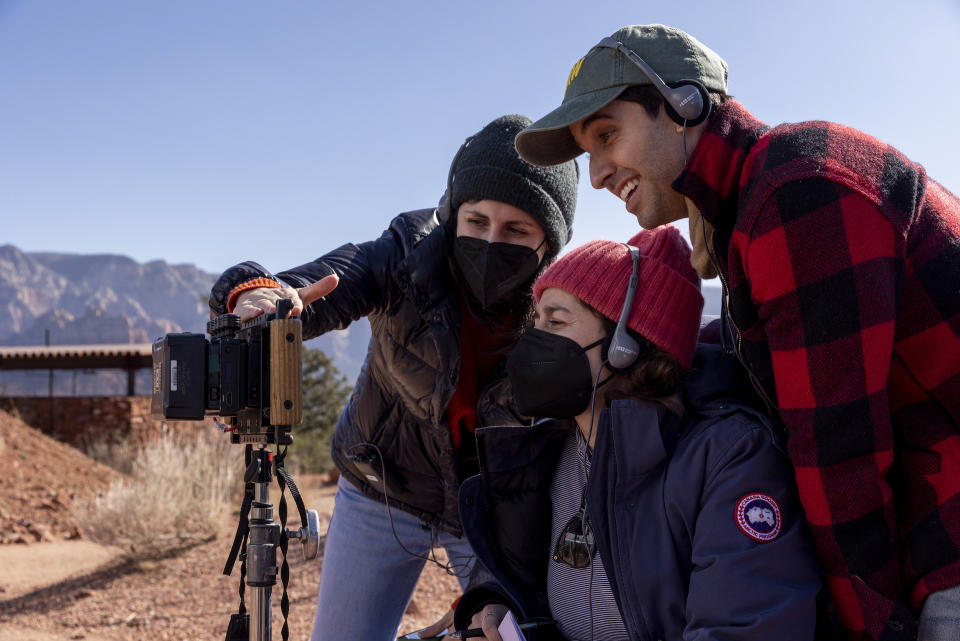
Karen Ballard/HBO Max
DEADLINE: Ava is basically on a “tail between her legs” tour. What did you want her to experience this season?
STATSKY: It’s very much what we have planned out from the beginning of the series and continuing in Season 2. Ava starts very resistant to working for Deborah and ends up betraying their difficult friendship by the end of Season 1. So we wanted to play with the idea of what happens when conflict is intimacy. We wanted to take this relationship that had deepened and become very important to the both of them and bring in this transgression of Ava’s and show how they would both deal with it. Ava would do her penance, and ultimately that would bring them closer together.
So crafting Ava’s arc, we just wanted to continue developing this character and deepening her appreciation for Deborah and their love. And for also just figuring out, “What does it mean to have this conflict with someone? How can I make up for it? How can I be better? How can I serve this woman?” And as the season goes, [she] kind of loses herself in the devotion to Deborah, which is ultimately why Deborah says, “I have to let you go and you have to go pursue your own things.” Hannah is such a brilliant actor and we are very lucky because there are so many little nuances that she can play in terms of Ava’s sensitivity and how she’s responding to Deborah.
DEADLINE: Because Season 2 was on the road, it also allowed for guest actors to come on for an episode. Did you have a wish list of people you wanted to bring on?
DOWNS: It is the dream of making the show and getting to work with so many talented people, who often times are prolific and have nonstop work and are really wonderful, but sometimes are underappreciated. I think that speaks to the purpose of the show. And so for us to be able to, not only write for, but work with people like Harriet Sansom Harris or Laurie Metcalf is really the biggest reward for us because we are such fans of comedic women. Or someone like Kaitlin Olson, who plays Deborah’s daughter DJ. Everyone knows she is funny, but because DJ is such a tragic character, it was great to see her delivering on the emotional scenes. It’s so gratifying to see that she is recognized [with a nomination] this year too.
DEADLINE: What made you write a stand-alone episode where Deborah and Ava go on a gay cruise?
ANIELLO: Well, there are two separate stories to tell. One is it was a very, very, very difficult thing to shoot in terms of getting a cruise to let us shoot, but Royal Caribbean allowed us to do it for two half-days. Between them loading passengers on, we would jump on, shoot, and then leave [laughs].
The other story is we talked a fair amount about orientation. Deborah sees orientation
as quite binary, while Ava obviously sees it in a far more nuanced way. But we hadn’t really had a serious conversation about it. One of the things that inspired us to make that episode was the conversation that they have in the bedroom. And the other thing is, we think it was just really funny that Deborah has this slightly internalized misogyny in terms of how her gay fans love her, but not the lesbians. Just the fact that she has that kind of old school perspective was interesting to us.
STATSKY: Tonally, the cruise episode may be a little campier for us, but in the end, it made us realize that there are ways we can push things in terms of what our audience wants to see. We can have an episode that goes there and is maybe a little different in tone, but then also allow for Deborah and Ava to have this extremely nuanced conversation about gender and sexuality where they’re expressing their different generational perspectives. I think people love that about the show at its core.
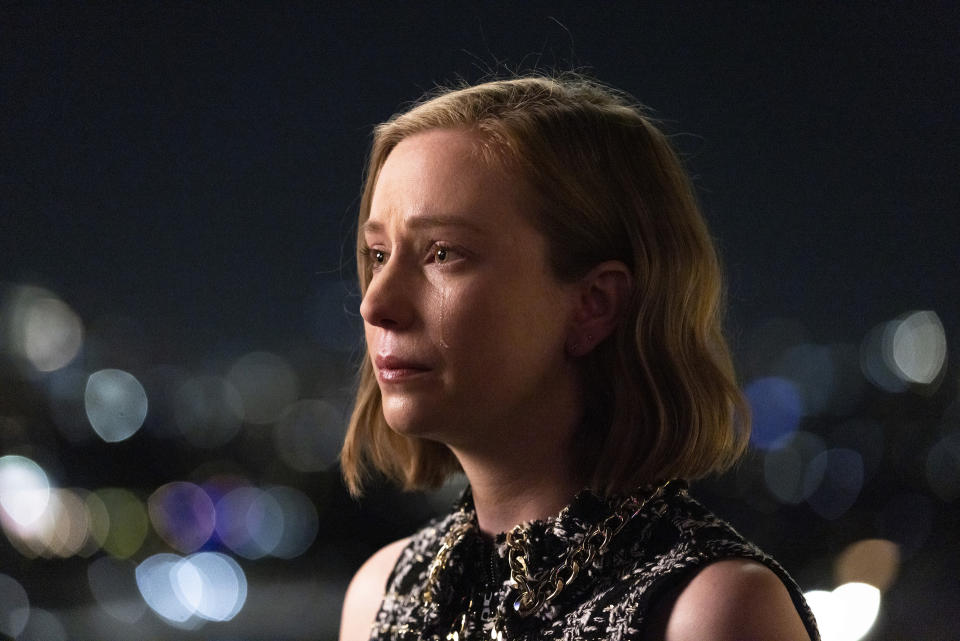
Karen Ballard/HBO Max
DEADLINE: In both seasons, you’ve done this thing where you blow everything up, whether positive or negative, and then rebuild the journey for the characters. Is that a planned approach for every season?
DOWNS: It’s true. We want to get to a place where, whether it’s a reset, because of the email that was hanging over Ava’s head in Season 1, or it’s Deborah letting Ava go, we do want there to be kind of like a reset. We thought of the show in 2015 and have mapped out what we want the series to do. We know our big tent poles, but it always means that we have that real challenge of being like, OK, what did we do now? We have to really make sure that we are rebuilding the Hacks cinematic universe. And so it always presents a challenge to us, but we have an amazing group of writers we work with, and we have a cast that can kind of do anything, so it is exciting. We get to jump without a net.
DEADLINE: The world of Hacks includes supporting characters the fans love. If there were talks of a spinoff, who would you like to see get their own show?
DOWNS: When we pitched the show, it was very much about this larger-than-life character and this younger person that she’s forced to work with. But we did always say that we wanted to have an exploration of the ecosystem of someone like a Deborah Vance, someone who’s had a lot of money and a lot of success, and what does it take to have that machine keep going? We really want to continue to not only write toward the ensemble, but also highlight the great actors we have in this ensemble. Whether it’s someone like Rose Abdoo who plays Josefina the maid. She is so fantastic and she’s someone that we keep talking about wanting to see more of her. Whether it’s getting Damien [Mark Indelicato] and Marcus [Carl Clemons-Hopkins] on the bus, or weaving Jimmy (Paul) and Kayla [Megan Stalter]’s storyline into the special taping for Deborah, I think we’ve been able to do it. Our ensemble is very important to the show.
DEADLINE: Lucia, it’s been said that while you were going through contractions, you were giving notes on an episode. That sounds like a comedy scene in itself.
ANIELLO: Oh yeah.
DOWNS: Lucia woke up and said, “I’m so sorry, but I am in labor.” And I was like, “What?” And she’s like, “But you should go ahead, direct and act today.” Because labor can be a long time, she’s like, “We may have days. Who knows? You should go to work.” So I went to work and she did, between contractions, give me notes. Now luckily, it was the scene where I tell Deborah I’ve left [the agency] Latitude and I have to be intimidated to do so. So, looking nerve-wracked was really simple. The acting was easy that day, because I was freaking out as Lucia was in labor.
ANIELLO: Honestly, it was a bit of a distraction because I don’t know if you’ve ever gone through labor, but you have these contractions, and in between the contractions you have a couple minutes of normalcy. I just wanted something to distract me in between the contractions. So they so nicely set up a system where I could watch takes from home. So for me it was a way to keep my mind off of the pain, and also calm me down.
STATSKY: If Lucia texted a note to give to an actor and they’re a little fuzzy on it, you say, “It’s from Lucia, she’s in labor.” You can’t say no to that [laughs].
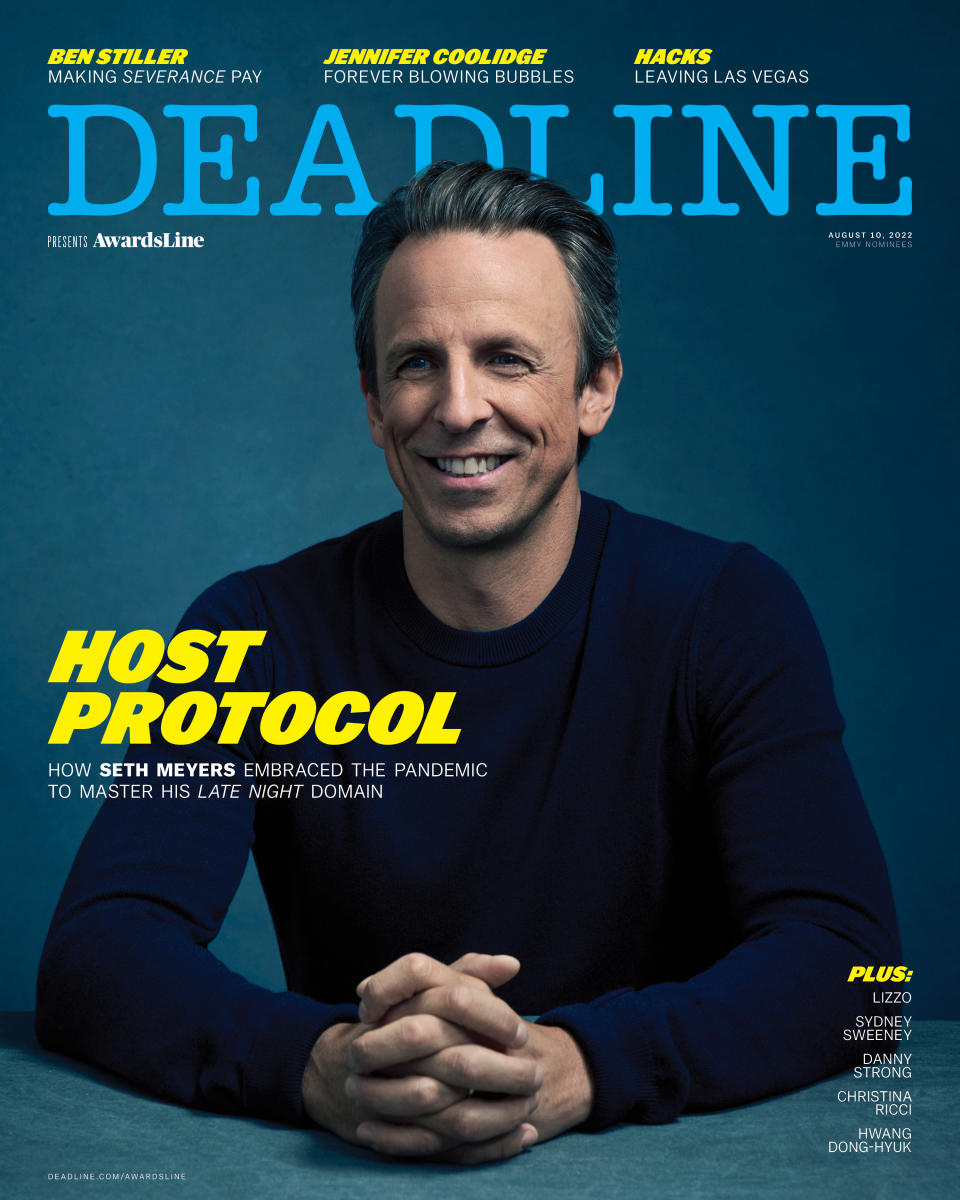
DEADLINE: Because the show has become so beloved in such a short time, how do you avoid the pressures of success when you’re trying to make the best possible show?
DOWNS: I think it’s a little bit like taking a note from Deborah Vance. Her mantra would be, “It’s about the work. Do the work, work hard.” And so we try and make it about output. Because people have really connected with these characters, I think the pressure we feel is mostly in delivering for them the show that they’ve come to love and to do it better than we have before. You’re in a race against yourself, and for us we just want to make the next season even better.
I think the other reason that there’s a lot of pressure for us is because it’s a show about women who have been cast aside and mistreated. With what’s going on in our country for women and potentially the LGBTQ community, especially with Supreme Court decisions, I feel like we feel even more pressure because this show represents queer people and women so much. We really try to make it as good as we can be because we want to be pushing culture and we want the show to resonate with people. Especially people who might not have an access point to women like this, or queer people like you see on our show. And so I think that makes us want it to be even better every time we do it.
Best of Deadline
Sign up for Deadline's Newsletter. For the latest news, follow us on Facebook, Twitter, and Instagram.

